
El Camino: A Goal-setting Sexual Health Promotion Program
- home
- Overview
- Development
- Evaluation
- Spanish Translation
Overview of El Camino (What It Is)
El Camino is a sexual health education program designed for Latino youth and based on the principles of positive youth development. El Camino provides education, skills, and support to empower its participants to set their own goals, make informed decisions about their sexual and reproductive health, and build healthy relationships. While created with Latino youth in mind, El Camino can be tailored to serve diverse populations of youth.
El Camino aims to change three key student behaviors that directly affect the program’s aim to empower youth to make sexual health decisions that support their identified academic and career goals. Youth are encouraged to: 1) Develop a plan to achieve positive life goals; 2) delay or abstain from sex; and 3) consistently and correctly use effective contraception and condoms, if sexually active.
These videos provide a brief overview of the El Camino program, highlighting perspectives of students who participated in it. Additional videos are available in Spanish and English, and showcase the impact of the El Camino curriculum from the perspectives of students, facilitators, and researchers.
Get the El Camino Curriculum
Materials for the El Camino curriculum are available in English and Spanish. Materials include key background information for implementing El Camino, including virtual facilitation tips; curriculum lesson plans for facilitators, which incorporate virtual adaptation instructions; and a student workbook. The El Camino curriculum and training are available through Healthy Teen Network.
The Lessons: Three Arcs
The El Camino curriculum contains eleven 45-minute lessons and is divided into three arcs: Goal Setting, Sexual and Reproductive Health, and Communication and Healthy Relationships.
Arc 1, Goal Setting, uses the imagery of a road (El Camino) to connect adolescents’ long-term goals with specific steps they can take to achieve those goals. Students themselves—without input from adults in their lives—set their goals and determine the steps they need to take to achieve those goals.
Arc 2, Sexual and Reproductive Health, works to build young people’s knowledge, attitudes, self-efficacy, and behaviors regarding reproductive biology, and to teach them effective methods of contraception—all necessary steps for youth to make informed decisions on ways to protect their sexual health and reach their goals.
Arc 3, Healthy Relationships, aims to help youth develop assertive communication skills to protect their progress toward their goals, accurately and effectively communicate their limits with partners, and enjoy healthy relationships.
![]()
El Camino Activities
Throughout the curriculum, young people participate in interactive activities that encourage them to think for themselves about important issues like relationships, school, and their futures. Sample activities include:
- Reading stories/novelas throughout the curriculum that feature teen characters with whom participants share key characteristics
- “Voting with your feet”—the activity of physically moving around a room to show agreement or disagreement with a statement or idea
- Role-playing with other students using scenarios about similar teenagers
- Participating in group discussions with teachers to discuss their thoughts and get answers to their questions
- Goal mapping—having participants write a personal goal they want to achieve by age 25 on a map and thinking about the steps necessary to reach that goal
- Practicing skills by implementing concepts learned (for example, practicing assertive communication with partners or proper condom use)
Development (Why and How We Made It)
Rationale
Overall, teen birth rates have declined and contraceptive use has increased in recent years, but racial and ethnic disparities persist. Additionally, few sexual education programs have been designed to meet the needs of Latino youth or found consistent impacts on sexual and reproductive health behaviors for Hispanic teens. The El Camino curriculum was developed as an effort to fill the gaps in programming for Latino adolescents. It builds on extensive research on promising approaches to reducing childbearing among Latino adolescents, and on interviews with teens, parents, program evaluators, and providers who have modified sexual health promotion programs for Latino teens.
These reviews and interviews indicated that the vast majority of Latino adolescents and their parents want to avoid early parenthood. In addition, both teens and parents strongly value education, have high educational aspirations, and see education as a path to economic success. This suggests a fresh approach to reaching Latino adolescents, specifically by helping them to align their behavior with their ambitious goals. In addition to this formative research, El Camino is grounded by three social and behavioral theories: the Theory of Planned Behavior, Social Learning Theory, and Social Cognitive Theory.
First Edition (2015–2020)
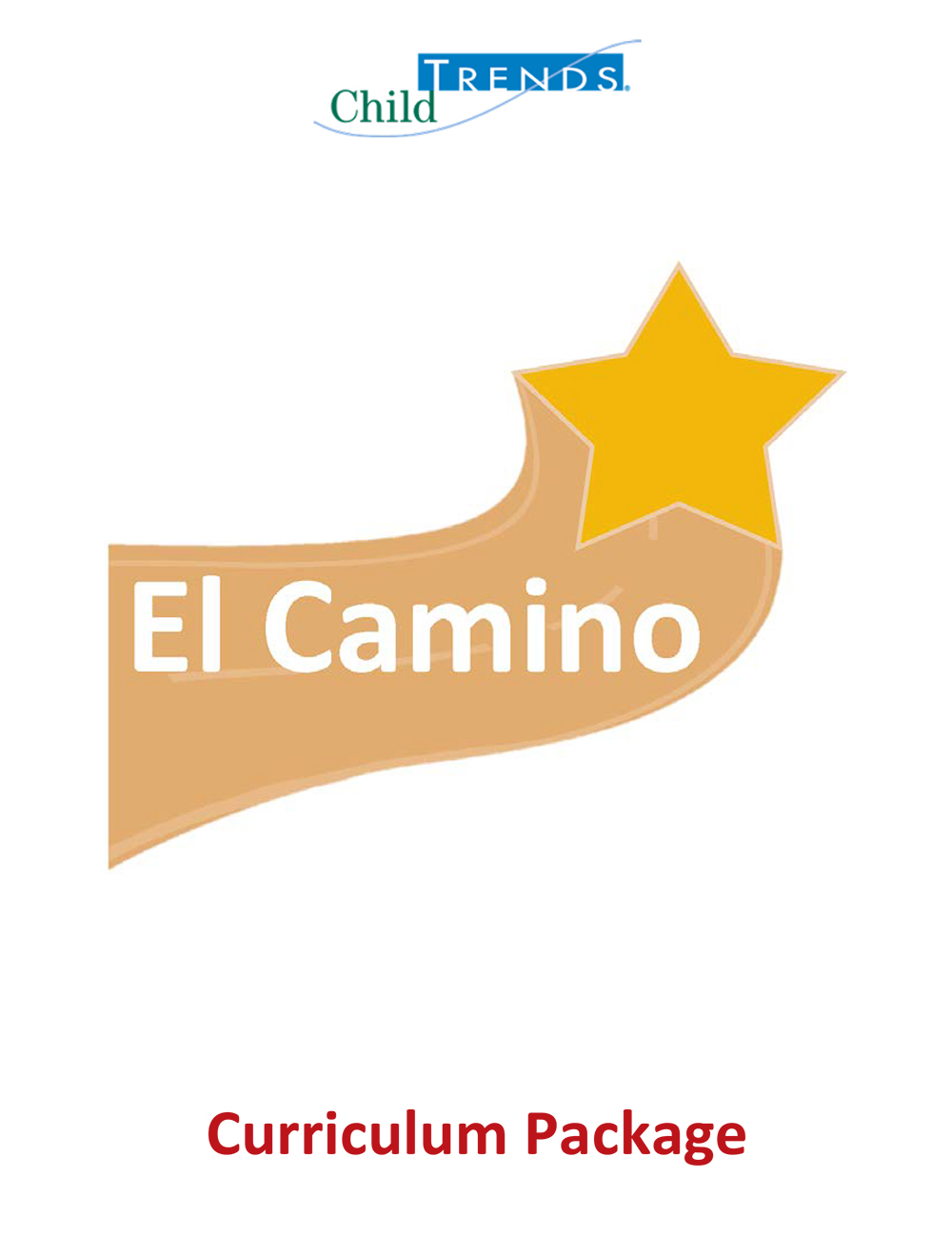 With funding from The JPB Foundation, researchers at Child Trends—Kristin Anderson Moore, Jennifer Manlove, Jenita Parekh, Bianca Faccio, Samuel Beckwith, and Lina Guzman—developed the curriculum in partnership with external advisors and curriculum writers Lori Rolleri and Linda Kaljee. Researchers at Child Trends—along with curriculum developers—worked with school staff, community members, and students to develop, test, and revise the curriculum by identifying culturally relevant activities that help Latino students see the links between unintended pregnancy and their goals.
With funding from The JPB Foundation, researchers at Child Trends—Kristin Anderson Moore, Jennifer Manlove, Jenita Parekh, Bianca Faccio, Samuel Beckwith, and Lina Guzman—developed the curriculum in partnership with external advisors and curriculum writers Lori Rolleri and Linda Kaljee. Researchers at Child Trends—along with curriculum developers—worked with school staff, community members, and students to develop, test, and revise the curriculum by identifying culturally relevant activities that help Latino students see the links between unintended pregnancy and their goals.Child Trends worked with partner schools and organizations to implement El Camino with diverse groups of students in both English and Spanish; during and after school; and with classroom teachers, AmeriCorps volunteers, and Communities in Schools staff. In total, El Camino was implemented with more than 300 students in 16 classrooms, across seven locations in six cities (Washington, DC; East Chicago, IL; Tacoma, WA; Baltimore, MD; Los Angeles, CA; and Philadelphia, PA). Drawing on observations, student focus groups and surveys, and facilitator feedback, Child Trends revised the El Camino curriculum in consultation with curriculum developers and sexual and reproductive health experts from ETR, SHIFT NC, YouthBuild, and Healthy Teen Network. El Camino was first published in 2019.
Preliminary findings suggested that youth responded well to the curriculum and that participation led to changes in their attitudes and knowledge. Child Trends surveyed these students before and after their participation in El Camino. At the post-test survey, the vast majority of students (91%) reported that El Camino had made them either less likely to have sex, more likely to use contraception, or more likely to use a condom.
Second Edition (2020–2023)
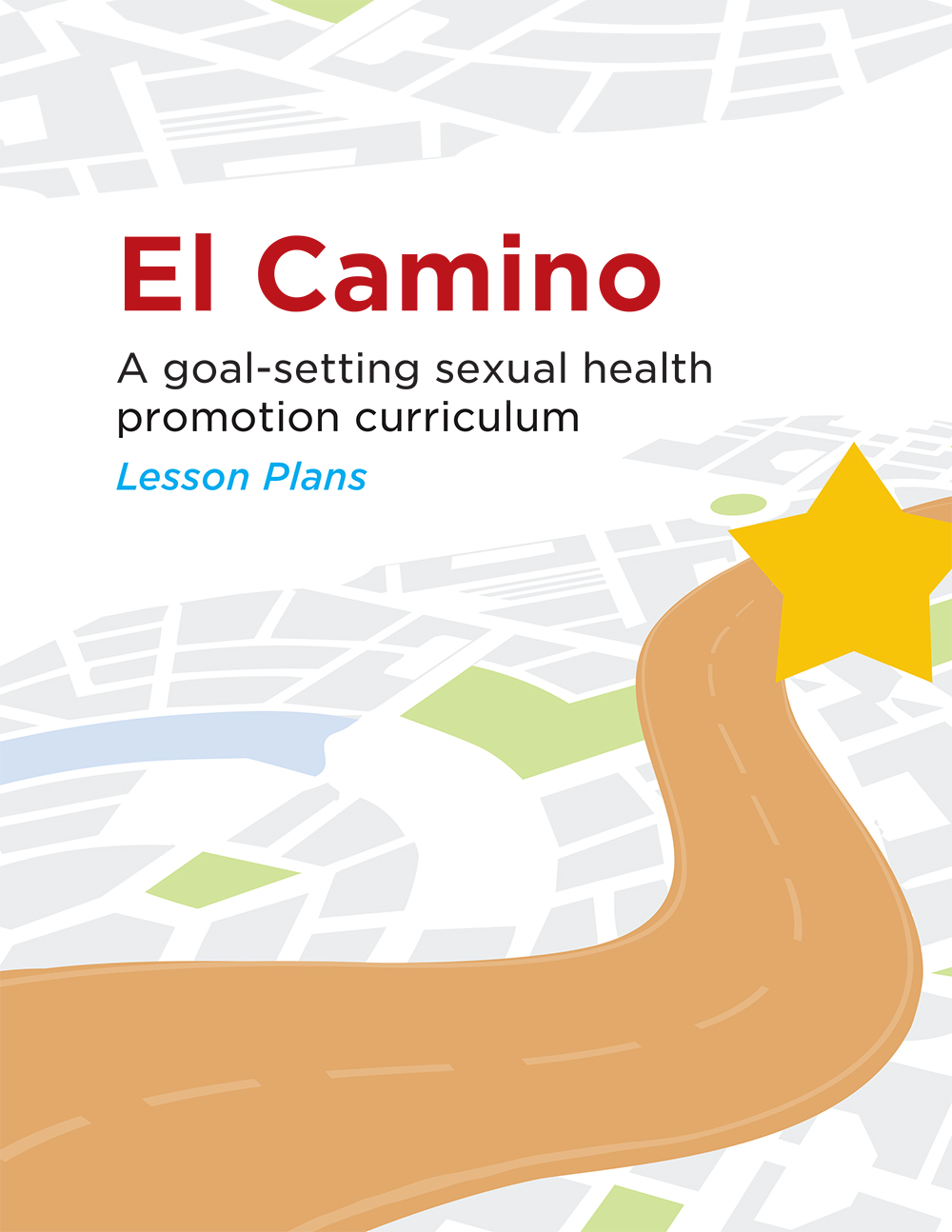 In 2020, Child Trends was selected by the U.S. Department of Health and Human Services (HHS) Office of Population Affairs (OPA) as a Teen Pregnancy Prevention Tier 2 Phase 2 – Rigorous Evaluation of Promising Interventions grantee. The research project was designed to implement and rigorously evaluate El Camino in high schools in Montgomery County, MD with high Latino populations disproportionately impacted by teen pregnancy. Upon award of the grant, Child Trends conducted a review of all project-related materials to ensure that they were medically accurate, age-appropriate, trauma-informed, and user-centered. Based on feedback from trauma and medical experts, Child Trends revised materials to strengthen trauma-informed approaches and republished the curriculum in 2021.
In 2020, Child Trends was selected by the U.S. Department of Health and Human Services (HHS) Office of Population Affairs (OPA) as a Teen Pregnancy Prevention Tier 2 Phase 2 – Rigorous Evaluation of Promising Interventions grantee. The research project was designed to implement and rigorously evaluate El Camino in high schools in Montgomery County, MD with high Latino populations disproportionately impacted by teen pregnancy. Upon award of the grant, Child Trends conducted a review of all project-related materials to ensure that they were medically accurate, age-appropriate, trauma-informed, and user-centered. Based on feedback from trauma and medical experts, Child Trends revised materials to strengthen trauma-informed approaches and republished the curriculum in 2021.Virtual adaptations
In response to the COVID-19 pandemic, curriculum updates in 2021 included adaptations for virtual delivery. The updated curriculum incorporates call-out boxes with instructions on how to adapt each activity for a virtual setting, instructional demonstration videos that can be used in place of in-person demonstrations, and strategies and tips for implementation and virtual facilitation. These updates help ensure that El Camino can be implemented with high quality and fidelity in a virtual setting.
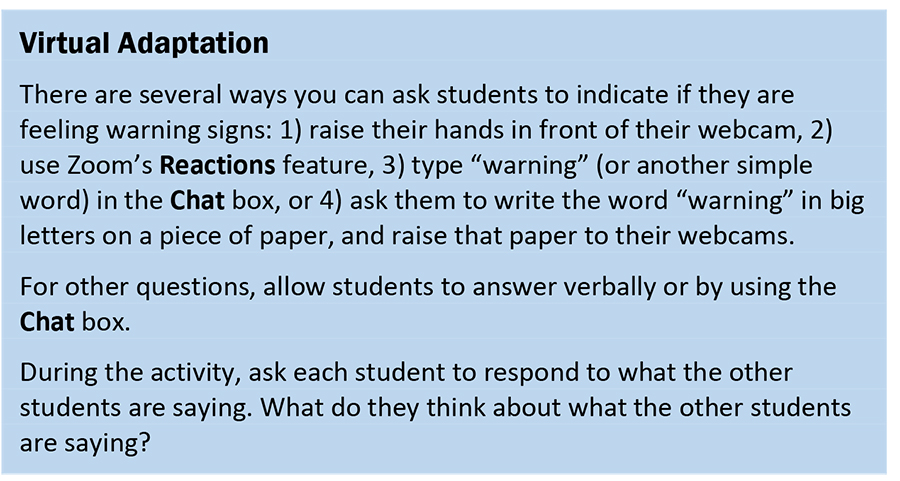
Third Edition (2024)
The third edition of El Camino contains updates made in 2024 to incorporate feedback from facilitators and make the curriculum more accessible. The curriculum is available through Healthy Teen Network, which will continue to ensure the curriculum stays updated.
Evaluation (What We Found)
Child Trends partnered with Identity to implement El Camino during school lunch periods, elective classes, or after school at 11 high schools in Montgomery County, MD—all of which have large Latino populations—across the 2020–2023 school years. Researchers from the University of Maryland evaluated El Camino’s effectiveness: Classes at each school were randomly selected to receive either El Camino or an alternative life skills program.
The evaluation study enrolled 746 students: 396 students across 34 classes (25 in Spanish and 9 in English) received the El Camino curriculum, while 350 students across 34 classes (27 in Spanish and 7 in English) received an alternative life skills program. Eighty-four percent of the students who participated in the evaluation were of Hispanic, Latino, or Spanish origin; 75 percent of students in the sample were born outside of the United States and came to the country at an average age of 14.1 years.
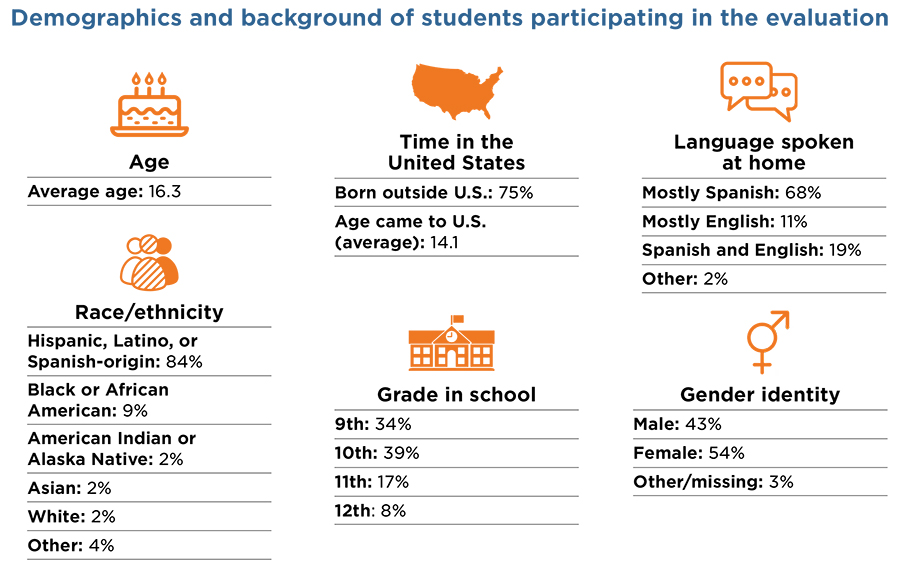
Program evaluation findings: Students’ pre-program survey responses highlight the need for sexual health and positive youth development curricula. One quarter of students had had penile-vaginal sex by the start of the program and more than half of sexually active students reported having unprotected sex.
Students who participated in El Camino had greater improvements in knowledge, self-efficacy, intentions, and attitudes from pre-test to post-test, relative to students who were enrolled in an alternative program.
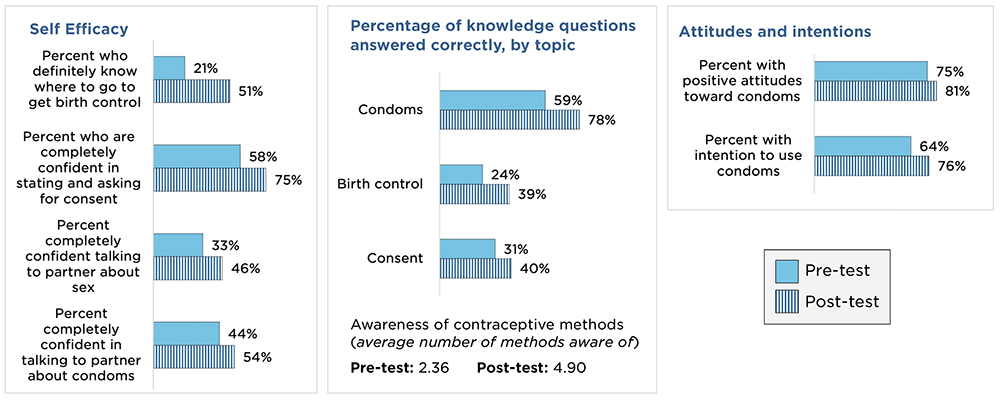
Note: Findings based on 289 students who received El Camino and completed both the baseline and post-test surveys. For all findings shown here, improvements from pre-test to post-test were significantly higher for the El Camino group than the control group based on multivariate impact analyses.
Additionally, students rated El Camino highly at post-test.

Impact evaluation findings
Researchers at the University of Maryland are currently completing analyses to estimate the long-term impacts of El Camino on sexual behavior and contraceptive use. Impact evaluation results will be published upon completion of this work. Stay tuned for impact evaluation results!
The project described was supported by Grant Number TP2AH000077 from the HHS Office of Population Affairs. Contents are solely the responsibility of the authors and do not necessarily represent the official views of the Department of Health and Human Services or the Office of Population Affairs.
© Copyright 2025 ChildTrendsPrivacy Statement
Newsletter SignupLinkedInYouTubeBlueskyInstagram